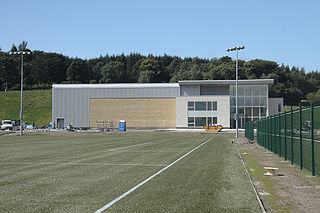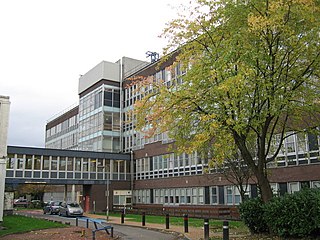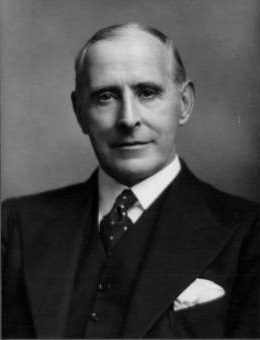
East Dunbartonshire is one of the 32 council areas of Scotland. It borders Glasgow City Council Area to the south, North Lanarkshire to the east, Stirling to the north, and West Dunbartonshire to the west. East Dunbartonshire contains many of the suburbs in the north of Greater Glasgow, including Bearsden, Milngavie, Bishopbriggs, Kirkintilloch, Lenzie, Twechar, Milton of Campsie, Balmore, and Torrance, as well as some other of Glasgow's commuter towns and villages. The council area covers parts of the historic counties of Dunbartonshire, Lanarkshire, and Stirlingshire.

Bishopbriggs is a town in East Dunbartonshire, Scotland. It lies on the northern fringe of Greater Glasgow, approximately 4 miles (6 km) from the city centre. Historically in Lanarkshire, the area was once part of the historic parish of Cadder - originally lands granted by King William the Lion to the Bishop of Glasgow, Jocelin, in 1180. It was later part of the county of Lanarkshire, and then an independent burgh from 1964 to 1975. Today, Bishopbriggs' close geographic proximity to Glasgow now effectively makes it a suburb and commuter town of the city.

Kirkintilloch is a town and former barony burgh in East Dunbartonshire, Scotland. It lies on the Forth and Clyde Canal and on the south side of Strathkelvin, about 8 miles (13 km) northeast of central Glasgow. Historically part of Dunbartonshire, the town is the administrative home of East Dunbartonshire council area, its population in 2009 was estimated at 19,700 and its population in 2011 was 19,689.

HMP Low Moss is located on the outskirts of Bishopbriggs, East Dunbartonshire; near Glasgow, Scotland. It has been operated by the Scottish Prison Service as a prison since 1968 and was for low-category prisoners who had sentences of less than 36 months to serve. The original establishment was closed in May 2007, with the entire site being cleared and redeveloped with a considerably enlarged footprint. The new prison was reopened in March 2012, and accepted its first intake in almost five years. Scott Watson is the Establishment's acting Governor.

Robroyston is a suburb of Glasgow, Scotland, located around three miles northeast of the city centre.

East Dunbartonshire was a county constituency of the House of Commons of the Parliament of the United Kingdom (Westminster). It elected one Member of Parliament (MP) by the first past the post system of election. The seat is possibly best known for formerly being the constituency of Jo Swinson, the former Leader of the Liberal Democrats who was defeated at the 2019 general election.

Lenzie is a small affluent town by the Edinburgh and Glasgow Railway in the East Dunbartonshire council area and the historic county of Dunbartonshire in Scotland. It is about 6 miles (10 km) north-east of Glasgow city centre and 1 mile (2 km) south of Kirkintilloch. At the 2011 census, it had a population of 8,873. The ancient barony of Lenzie was held by William de Comyn, Baron of Lenzie and Lord of Cumbernauld in the 12th century.

Twechar is a small former mining village historically in Dunbartonshire and administered by the council area of East Dunbartonshire, Scotland close to the boundary with North Lanarkshire. It lies between the larger towns of Cumbernauld, Kilsyth and Kirkintilloch. The Forth and Clyde Canal runs close to the village to the north, and closely follows the line of the Antonine Wall. There are visible remains of the wall on Bar Hill and the Roman Fort is a local tourist attraction.

Adamslie Park was formerly a football ground in Kirkintilloch, East Dunbartonshire, Scotland, which was the home ground of Scottish Junior Football Association club Kirkintilloch Rob Roy F.C. until 2014. It was located on Glasgow Road in the north-west of the town and had a capacity of 5,500 all standing. Whilst the facility was primarily used for football matches, it had been the venue for Highland Games, and annual Lairdsland Primary School Sports Days, in the past.

Torrance is a relatively affluent village in East Dunbartonshire, formerly Stirlingshire, Scotland, located eight miles north of Glasgow city centre. Torrance used to mainly consist of farmland. The village was once famous as a resting place for workers on their way to the Campsie Fells four miles north. The Forth and Clyde Canal has a wharf nearby at Hungryside, and the A807 runs along its southern edge. The village has an active community charity whose aims are to improve the village facilities.

Stobhill Hospital is located in Springburn in the north of Glasgow, Scotland. It serves the population of North Glasgow and part of East Dunbartonshire. It is managed by NHS Greater Glasgow and Clyde.
Turnbull High School is a co-educational comprehensive secondary school located in Bishopbriggs, East Dunbartonshire, Scotland. The school was named after William Turnbull, Bishop of Glasgow from 1448 to 1454, and founder of the University of Glasgow in 1451, of which he was the first Chancellor. Whilst enrollment is open to pupils of all religious denominations and none, the School's religious ethos emphasises practice of Roman Catholic moral values both in the church and in the community, with its own Chaplain and many associated charitable and community-based activities undertaken.

Lennoxtown Training Centre is Celtic F.C.'s training centre, located at Lennoxtown, East Dunbartonshire in Scotland. The complex houses the club's training and educational facilities.

The Auld Aisle Cemetery is located in Kirkintilloch, East Dunbartonshire, Scotland. The cemetery is protected as a category A listed building, and includes graves dating back to the eighteenth century.

Kirkintilloch Town Hall is a municipal building in Union Street in Kirkintilloch, East Dunbartonshire, Scotland. It is a category B listed building.

Broomhill Football Club is a Scottish football club that plays its home matches at Dumbarton Football Stadium in Dumbarton, West Dunbartonshire. They are members of the Scottish Lowland Football League, in the fifth tier of the Scottish football league system. The club was formed in 2014 as BSC Glasgow, a senior team associated with Broomhill Sports Club, a youth sports organisation based in the Broomhill area of Glasgow, and was elected to the Lowland League for the 2014–15 season. They originally shared with Maryhill F.C. at their Lochburn Park ground before relocating to Alloa in 2016. In 2021, the senior team split from Broomhill Sports Club, who launched a new BSC Glasgow team in the development division of the West of Scotland Football League, with the senior team being renamed Broomhill F.C. and retaining the Lowland League place.

Vale of Leven District General Hospital or simply the Vale of Leven Hospital is a district general hospital in Alexandria, West Dunbartonshire, Scotland. It is managed by NHS Greater Glasgow and Clyde.

James Rankin Rutherford was a Scottish Liberal Party politician. He was the Provost of Kirkintilloch 1931–33 and Convener of the County Council 1939–1945.

Stoneyetts Hospital was a psychiatric hospital located in Moodiesburn, near Glasgow. Opened in 1913, Stoneyetts served as an important source of employment for residents within the expanding Moodiesburn area. The function of the institution changed throughout its existence: it originally cared for those with epilepsy, before housing people with intellectual disability, and from 1937 treating those with mental disorders. By the early 1970s there was an emphasis toward psychogeriatric care at the hospital.

Beatrice Clugston was a British philanthropist in Glasgow.




















